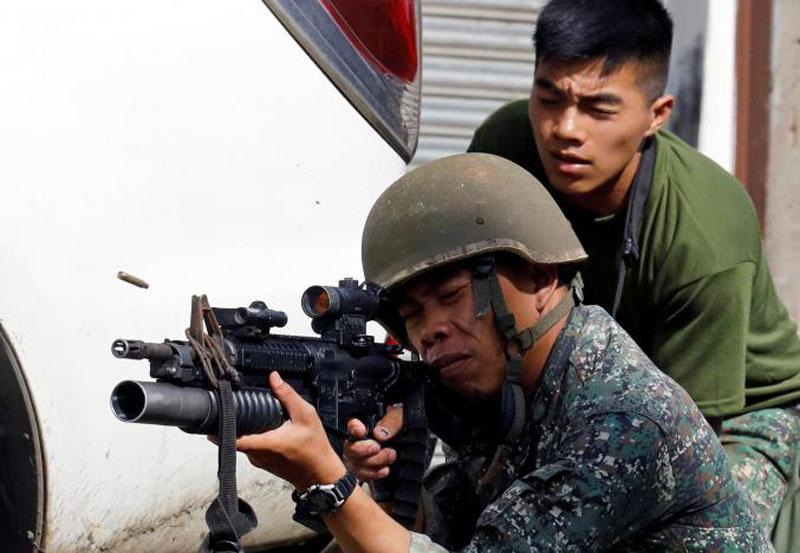Philippine crisis deepens as air strike on rebels kills 11 soldiers
MARAWI/MANILA: An air strike on Islamist rebel holed up in a southern Philippine city has killed 11 government troops, the armed forces said on Thursday, in a major blow to the country's bid to end its biggest internal security crisis in years.
The bombing accident happened on Wednesday when one of two planes bombing rebel positions missed its target in the heart of Marawi City, where ground troops have been battling pro-Islamic State militants holed-up in buildings for nine days.
The incident came during what was the first offensive deployment of fixed-wing aircraft in the nine-day operation, aimed at flushing out the Islamist gunmen who have defied expectations by clinging on through days of ground assaults and helicopter rocket attacks.
"Sometimes in the fog of war a lot of things could happen. Accidents happen, like this," Defense Secretary Delfin Lorenzana told a news conference.
"It's very sad to be hitting our own troops," he added. "There must be a mistake somewhere, either someone directing from the ground, or the pilot."
The Maute group has been a fierce enemy of a military with superior firepower and greater troop strength.
The government is concerned that the group's brazen attack and its resilience could strike a chord with the Islamic State leadership in the Middle East and win its endorsement as its Southeast Asian affiliate.
The deaths of the soldiers takes the number of security force members killed to 38, with 19 civilians and 120 rebel fighters killed in the battles in Marawi over the nine days.
Lorenzana said militants who were Saudi, Malaysian, Indonesian, Yemeni and Chechen were among eight foreigners killed in the fighting, in what experts say is a sign the Philippines may have a major problem on its hands.
An exodus of residents from mainly Muslim Marawi started on May 23, when the Maute rebels ran amok, torching and seizing buildings, stealing police weapons and vehicles, taking hostages, and freeing jailed rebels to rejoin their fight.
The military added 21 armored vehicles and a third battalion of troops to the operation on Thursday to put an end to the occupation.
CANNOT HOLD OUT
Lorenzana said the military might suspend air strikes, describing the rebels as a small force that "cannot hold that long".
Bombardments by OV-10 light attack aircraft were carried for over an hour early on Thursday. Troops engaged rebel snipers, as helicopters circled identifying targets.
A fire blazed in one building moments after a plane dropped its payload. Smoke rose into the sky.
President Rodrigo Duterte is concerned radical ideology is spreading in the southern Philippines and it could become a haven for militants forced out of Iraq and Syria.
He made no mention of the killing of soldiers by air force planes in a speech on Thursday. He said the Maute group was being given too much credit, and that the occupation of Marawi was the work of Islamic State, and planned a long time ago.
"You know, the rebellion in Mindanao, it's not Maute, it's purely ISIS," he said.
The military was carrying out air strikes on locations it believes are sheltering Isnilon Hapilon, the so-called emir of Islamic State and point man in the Philippines.
The capture or killing of Hapilon would be a much-needed public relations boost for the military as the Maute fighters capitalize on the publicity from their defiant stand.
Islamic State flags around Marawi have been spotted by media. Images have been circulated widely on social media of smiling fighters dressed in black attire typical of the group, posing with trophies that include stolen government weapons and armored vehicles hit by rocket-propelled grenades.
A video posted on the website of Islamic State's Amaq news agency shows fighters alongside bodies of dead soldiers inside a vehicle. The authenticity of the video and the images on social media could not be independently verified.
Military spokesman Restituto Padilla said an investigation would be held to establish how the air force plane killed ground troops.
"The risk involved in being a soldier, being an airman, being a sailor, being a marine is very much in the heart of every soldier," he said.
"He knows where we are entering into. But the mission continues."






